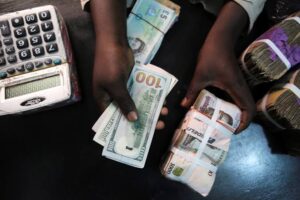Does Nigeria have a Fixed Exchange Rate?
Exchange rates have always been the method through which a particular country’s economic performance is determined, which is evident in their currency value.
The rates are determined when the currencies are compared to the most potent money globally, which is the US dollar.
In Nigeria, exchange rates have either increased or decreased when the global oil prices have either increased or decreased.
The influence of oil on our exchange rate is because crude oil accounts for over 90% of our value export. Due to that, the strength of the Naira against the dollar will only improve when Nigeria exports enough crude oil, thereby making enough revenue.
Unfortunately, since 2014, the economy started having strains due to the significant decrease in oil prices worldwide. For a country that was highly dependent on oil, this was bound to happen.
In the present administration, efforts have been made to improve the strength of the Naira against the dollar to ensure that the Naira is not devalued. This is where the Nigerian exchange rate system comes into play.
What is the Exchange Rate System in Nigeria?
Nigeria used to run a fixed exchange system starting from the 80s during the oil boom period in the country. This rate ensured that when the dollar improves, the Naira will also enhance, stabilizing the currency.
This will continue as long as both Nigeria, and the US continue to do business together. This worked out well for the country as the economy continued to thrive.
But due to specific government policies and, to a large extent, corruption, the value of the Naira depreciated slowly but at a manageable rate.
The crash in global oil prices marked the beginning of economic problems for Nigeria. This is because the Nigerian economy was 90% dependent on oil, and it became its major export to the US and other European countries around the globe.
When the oil price started to reduce, this affected the number of patronages that Nigeria received from most countries.
The most notable was the US, which began to reduce their trade when looking at alternative power sources for their automobile engines.
The implication is that with lesser patronage, the country experienced a shortage of dollars in the market to offset the enormous demand from importers and petroleum marketers. This made the Naira reduce significantly in value.
As mentioned earlier, the President Buhari administration in 2016 introduced a Floating Exchange rate system for Nigeria to solve falling oil prices.
This culminated in a multiple exchange system where only the government officials and authorized petroleum exporters will receive dollars at an official fixed rate.
At the same time, the parallel market performance will determine its price. There were also other rates for Small and Medium-sized Enterprises to improve liquidity.
The various fluctuations in dollar prices have continued to affect Nigerians who are frequent travellers abroad or those in other countries while sending money down to the country.
One can never know the current rate to settle on when trying to make a forex exchange. Another issue is that the Nigerian economy has not diversified to the extent that it can strengthen the Naira.
Why is the Naira so weak?
Here are some reasons:
Global Decrease of Crude oil
There are so many factors that culminated in the very reason why the Naira is weak. Chief amongst this is that crude oil, which is the country’s primary export, has started experiencing a price decrease.
The effect of this on the Nigerian economy is massive that with little or no demand from foreign bodies, the country will not have enough dollars to circulate. Hence the price of the Naira will tank in reaction to that.
Little to no Export
Another huge factor that has devalued the Naira is that the ratio of import to export in the country is very low. The Nigerian foreign trade report showed a record $47 billion spent on importation alone in 2019 instead of $32 billion the year before.
It offers a pattern of massive dependence of the Nigerian economy on importation instead of producing goods locally.
As far as the country does not export more goods apart from crude oil, the Naira will continue to suffer.
Another disadvantage of over importation is that it leads to massive dollar demands as importers will need them to purchase their goods abroad. With a low export, the Naira will find it hard to cope, which weakens it further.
Political Instability
A country is only as good as its governing body, which has been the case of Nigeria lately. The country’s political structure is unbalanced to a level that certain parts of the country are not progressing economically.
When you add the fact that the government is experiencing its lowest security index in years. Terrorism and banditry have become the order of the day.
This scares away potential foreign investment that could have improved the economy.
When a country can no longer attract foreign investors, its economy will suffer, and hence the currency will be significantly affected.
This is the case of the Naira at the moment. Nigeria has one of the biggest economies in the world.
Still, because it can no longer attract investors from outside the country, there will be little chance of exchanging their currencies with the Naira. This and other factors further weakens the Naira.
In Conclusion
It’s hard to predict the fate of the Nigerian economy in the years that are to come. But it is apparent for all to see that Nigeria needs massive change in economic policy for significant changes to happen.
Whether it will be a Fixed exchange rate or a Floating exchange rate is yet to be seen, both will have their day.